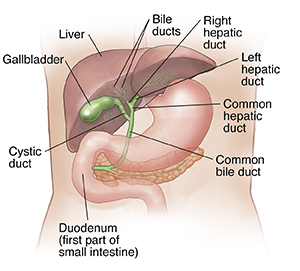The Biliary System: Anatomy and Functions
Anatomy of the biliary system
The biliary system consists of the organs and ducts that help to make and transport bile. These include the bile ducts, gallbladder, and related structures.

The transportation of bile follows this sequence:
-
When the liver cells secrete bile, it is collected by a system of ducts that flow from the liver through the right and left hepatic ducts.
-
These ducts ultimately drain into the common hepatic duct.
-
The common hepatic duct then joins with the cystic duct from the gallbladder to form the common bile duct. This runs from the liver to the first section of the small intestine (the duodenum).
-
But not all bile runs directly into the duodenum. About half of the bile produced by the liver is first stored in the gallbladder. This is a pear-shaped organ located directly below the liver.
-
Then, when food is eaten, the gallbladder contracts and releases stored bile into the duodenum to help break down the fats.
Functions of the biliary system
The biliary system's main function includes the following:
Bile is the greenish-yellow fluid (made of waste products, cholesterol, and bile salts) that is secreted by the liver cells to do these two main functions:
Bile salt is the actual component that helps break down and absorb fats. Bile, which is excreted from the body in the form of stool (feces), is what gives stool its dark brown color.
Online Medical Reviewer:
Jen Lehrer MD
Online Medical Reviewer:
Raymond Kent Turley BSN MSN RN
Online Medical Reviewer:
Rita Sather RN
Date Last Reviewed:
1/1/2023
© 2000-2024 The StayWell Company, LLC. All rights reserved. This information is not intended as a substitute for professional medical care. Always follow your healthcare professional's instructions.